Bréguet 941
The Breguet 941 was a French four-engine turboprop STOL transport aircraft developed by Breguet in the 1960s. Although widely evaluated, it was not built in large numbers, with only one prototype and four production aircraft being built.
| Br 941 | |
|---|---|
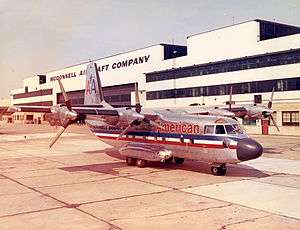 | |
| The prototype as the McDonnell 188 | |
| Role | STOL Transport |
| Manufacturer | Breguet |
| First flight | 21 May 1958 (Breguet 940) 1 June 1961 (Breguet 941) |
| Introduction | 1967 |
| Retired | 1974 |
| Primary user | French Air Force |
| Number built | 1 (940) + 1 (941) + 4 (941S) |
Design and development
In the late 1940s and early 1950s, the French aviation pioneer Louis Charles Breguet developed a concept for a Short Take Off and Landing (STOL) aircraft using four free-turbine turboshaft engines to drive a common powershaft, which, in turn drove four oversize propellers, which were evenly spaced along the leading edge of the wing with large, full-span, slotted flaps, with the arrangement known as "l'aile soufflée" or blown wing.[1]
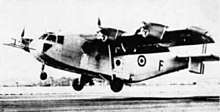
An initial, experimental prototype, powered by four Turbomeca Turmo II engines, the Breguet 940 Integral, first flew on 21 May 1958,[1] and was used to prove the concept, demonstrating excellent short field performance. This led to an order being placed in February 1960 for a prototype of an aircraft employing the same concept, but capable of carrying useful loads. This aircraft, the Breguet 941, first flew on 1 June 1961.[2]
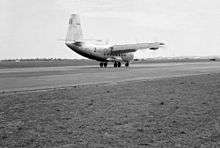
Testing of this prototype resulted in an order for four improved production aircraft, the Breguet 941S for the French Air Force, first flying on 19 April 1967. These were fitted with more powerful engines and a modified rear cargo door to allow for air-dropping of stores.[2]
Br 942
Breguet intended to develop the 940 genre further by adding a pressurised fuselage with airline seating as the Breguet Br 942. Wings, landing gear, empennage and engines were essentially similar to the Br 941, but were to be mated to a new 3.1 m (10 ft 2.0 in) diameter circular section fuselage, with airline seating for 40 first/business class or up to 60 economy class passengers. After the limited success of the Br 941 and Br 941S and expected high running costs, further development was abandoned.[3]
Operational history
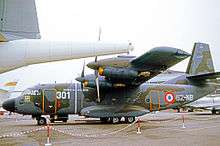
The 941 prototype was tested extensively by both France, and the United States, where a license agreement had been consummated with McDonnell Aircraft. The prototype, known as the McDonnell 188 in the US, was evaluated by both NASA [4][5] and the US military, but no orders were placed. Several photos of the McDonnell-Douglas 188 are on display at the Air Museum in San Diego, in American Airlines and Eastern Airlines liveries. The second Br 941S also carried out a tour of the United States, being evaluated as a STOL passenger airliner for operation from small city airports,[6] although, again, no orders resulted. This aircraft demonstration activity included flights for Eastern Airlines in the northeast U.S.
The four Breguet 941S aircraft entered service with the French Air Force in 1967, serving until 1974.[1]
Variants
- Breguet Br 940 Integral
- Experimental prototype for concept demonstration, one built, powered by 4 298.3 kW (400 hp) Turbomeca Turmo II turboshaft engines.[3]
- Breguet Br 941
- Prototype transport, one built, powered by 4 913.5 kW (1,225 hp) Turbomeca Turmo IIID turboshaft engines.[3]
- Breguet Br 941S
- Production version for the French Air Force, an enlarged version of the 941, four built, powered by 4 1,081.3 kW (1,450 hp) Turbomeca Turmo IIID3 turboshaft engines.
- Breguet Br 942
- The proposed airliner development to have had a pressurised fuselage with airline seating for 40 first/business class or up to 60 economy class passengers.[3]
- Breguet 945
- Studies for a smaller version of the Breguet 942, primarily for military use, for operation from 304.8 m (1,000 ft) length hot and high airstrips. Power was to be supplied by two 1,081.3 kW (1,450 hp) Turbomeca Turmo IIIDs and a payload of about 1,497 kg (3,300 lb) would be carried for more than 1,448.4 km (900 mi) at about 386.2 km/h (240 mph). Development of the 945 was not continued to production status.[7]
- McDonnell 188
- (Later McDonnell-Douglas 188). Proposed licence manufacture and development in the United States by the McDonnell Aircraft Corporation.
Surviving aircraft
- The third Breguet 941S [941S-03] coded 62-NC was previously on display at the Parc Avenue amusement park in Lanas, France but has now moved to the Toulouse Aircraft Museum at Toulouse Blagnac Airport
- The fourth Br 941S [941S-04] coded 62-ND is stored with the Musée de l'Air et de l'Espace at the Dugny storage site on the far side of Paris Le Bourget Airfield.
Specifications (Br 941S)
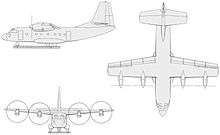
Data from The Encyclopedia of World Aircraft [2]
General characteristics
- Crew: 2
- Capacity: 57 civil passengers or 40 fully loaded troops or 24 stretchers
- Length: 23.75 m (77 ft 11 in)
- Wingspan: 23.4 m (76 ft 9 in)
- Height: 9.65 m (31 ft 8 in)
- Wing area: 83.8 m2 (902 sq ft)
- Airfoil: NACA 63A416[8]
- Powerplant: 4 × Turbomeca Turmo IIID3 turboprop engines, 1,119 kW (1,501 hp) each all four engines linked by transmission shafts
- Propellers: 3-bladed constant-speed propellers
Performance
- Maximum speed: 450 km/h (280 mph, 240 kn)
- Cruise speed: 400 km/h (250 mph, 220 kn)
- Range: 1,000 km (620 mi, 540 nmi)
- Service ceiling: 9,500 m (31,200 ft)
- Take-off run: 185 m (607 ft) at 22,000 kg (48,502 lb)
See also
Aircraft of comparable role, configuration and era
References
- "Aérostories Breguet Br 940/941 The Airplane with the "Deflection slipstream concept"". Retrieved 2007-07-02.
- Donald, David (Editor) (1997). The Encyclopedia of World Aircraft. Aerospace Publishing. ISBN 1-85605-375-X.CS1 maint: extra text: authors list (link)
- Taylor, John W.R. FRHistS. ARAeS (1962). Jane's All the World's Aircraft 1962–63. London: Sampson, Low, Marston & Co Ltd.
- Borchers, Paul F.; Franklin, James A.; Fletcher, Jay W. "Flight Research at Ames, 1940–1997, Chapter 8 Boundary Layer Control, STOL, V/STOL Aircraft Research NASA SP-3300". Retrieved 2007-07-02.
- Hartman, Edwin P. "Adventures in Research: A History of Ames Research Center 1940–1965, Part III: THE LEAP TO SPACE : 1959–1965, 1963–1965, NASA SP-4302". Retrieved 2007-07-02.
- "Starting STOL". Time. 1968-08-16. Retrieved 2007-07-03.
- "Commercial Aircraft of the World". Flight International: 860. 29 November 1962. Retrieved 29 April 2013.
- Lednicer, David. "The Incomplete Guide to Airfoil Usage". m-selig.ae.illinois.edu. Retrieved 16 April 2019.
Further reading
- "Commercial Aircraft of the World". Flight International: 860. 29 November 1962. Retrieved 29 April 2013.
External links
| Wikimedia Commons has media related to Bréguet 941. |